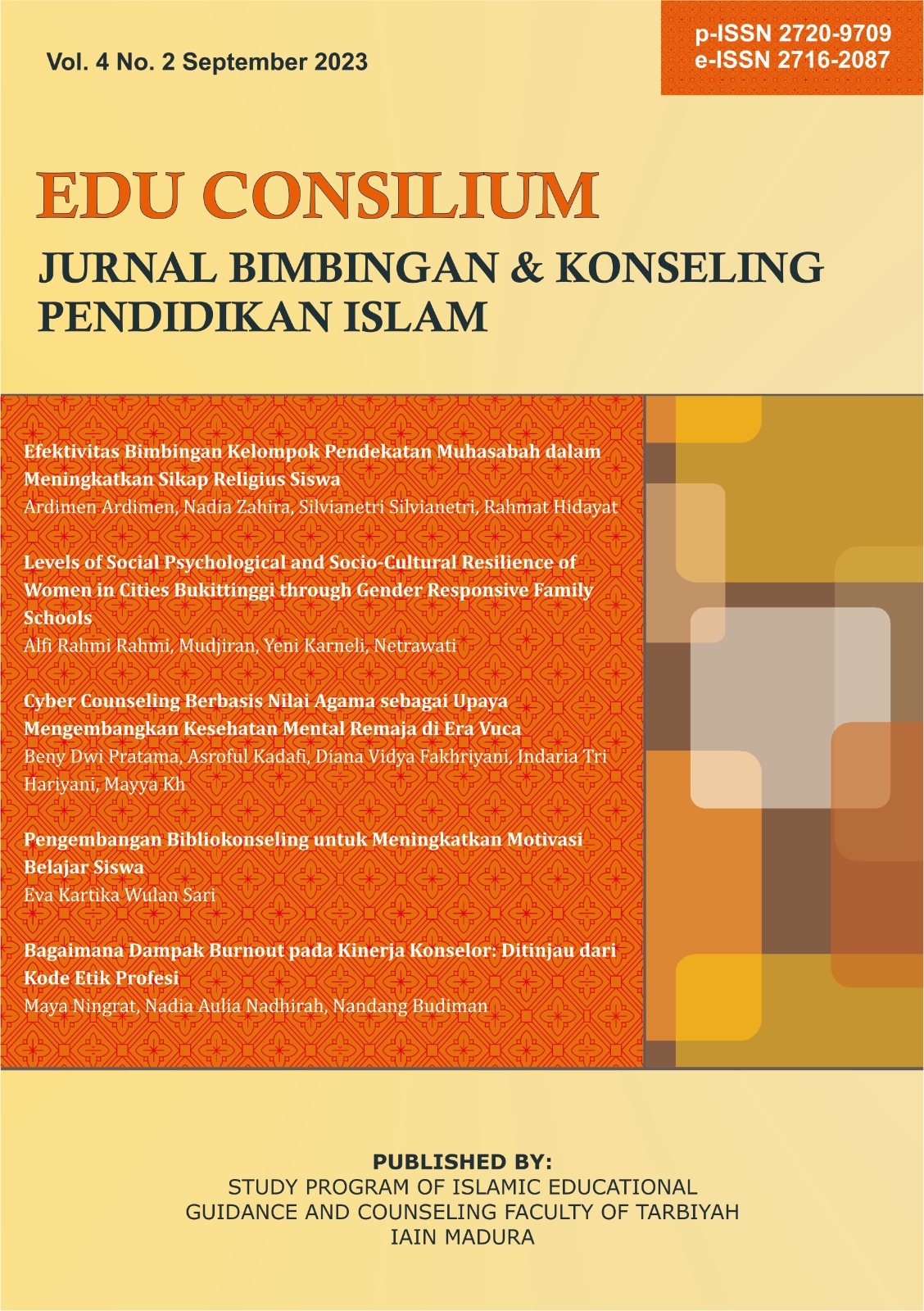Cyber Counseling Berbasis Nilai Agama sebagai Upaya Mengembangkan Kesehatan Mental Remaja di Era Vuca
 Abstract views: 367
,
Abstract views: 367
,
 PDF downloads: 404
PDF downloads: 404
Abstract
Mental health problems are essential in the VUCA era. Developmental demands in the VUCA era can make individuals anxious and depressed so that it can have an impact on their mental health. In order for individuals to avoid mental health problems, there needs to be a solution to prevent them. In this study, researchers used online counseling (cyber counseling) based on religious values as an effort to develop students' mental health. The method used in this study is the experimental method, to be precise, the quasi pre-post experiment design. The results of the study show that online counseling (cyber counseling) based on religious values can develop mental health in individuals. Cyber counseling is intended as an alternative virtual counseling model in developing individual mental health and of course mental health as well.
Downloads
References
Albesher, A. A. (2019). IoT in Health-care: Recent Advances in the Development of Smart Cyber-Physical Ubiquitous Environments. IJCSNS International Journal of Computer Science and Network Security, 19 (2), 181–186.
Bimbingan, P., & Tegal, U. P. (2019). KONSEP DIRI PESERTA DIDIK Sukoco KW M. Arif Budiman S. 03, 6–10.
Budianto, A. E., Hidayah, N., Aziz, A., & Malang, U. N. (2019). Aplikasi cyber counseling dengan mengoptimalkan whatsapp berbasis komputasi mobile. 2, 182–193.
Dami, Z. A., & Anas Waluwandja, P. (2019). European Journal of Education Studies Counselee Satisfaction In Face-To-Face And Cyber-Counseling Approach To Help Cyber-Bullying Victims In The Era Of Industrial Revolution 4.0: Comparative Analysis. Oapub.Org, 6, 232–245. https://doi.org/10.5281/zenodo.3344908
Happyanie, S. W., & Wiryosutomo, H. W. (2020). Hubungan antara Tingkat Pemahaman Multibudaya dengan Keterampilan Konselor dalam Layanan Konseling Individual. Jurnal BK UNESA, 11 (1).
Hermawan, R. (2020). Optimizing Employee Engagement to Improve Human Resources Performance: A Case Study of A Private University in Facing the VUCA Era. Technium Social Sciences Journal, 12.
Kadafi, A. (2016). Urgensi Konseling Islami Dalam Layanan Konseling Di Era Masyarakat Ekonomi ASEAN. Proceedings International Seminar FoE (Faculty of Education), 209–219.
Kadafi, A. (2019). Pedoman Pelaksanaan Layanan Bimbingan dan Konseling Islami di Sekolah. UNIPMA Press.
Kadafi, A., Pratama, B. D., Suharni, S., & Mahmudi, I. (2020). Mereduksi perilaku phubbing melalui konseling kelompok realita berbasis islami. 5(2), 31–34.
Kirana, D. L. (2019). Cyber Counseling Sebagai Salah Satu Model. Al-Tazkiah, 8 (1), 51–63.
Kuliyatun. (2020). Bimbingan Dan Konseling Islam Dalam Meningkatkan Religiusitas Siswa Sekolah Menengah Atas (SMA). 02(01), 91–113.
Kusnadi, N., Mahmudi, I., & Pratama, B. D. (2022). Konseling Behavioral Teknik Kontrak Perilaku Untuk Mengurangi Kecemasan Menghadapi Ujian Siswa. 6(1), 89–97.
Nurfarhanah, Afdal, Andriani, W., Syahniar, Mudjiran, Daharnis, & Zikra, Z. (2019). Analysis of the Causes of Cyberbullying: Preliminary Studies on Guidance and Counseling Media. International Conference on Education Technology (ICoET 2019), 372(ICoET), 300–306.
Pasmawati, H. (2016). Cyber Counseling Metode Pengembangan Layanan Kounseling Di Era Global. Jurnal Ilmiah Syi’ar, vol 16, hlm. 5-7.
Petrus, J., & Sudibyo, H. (2017). Kajian Konseptual Layanan Cyberconseling. Konselor, 6 (1), 6. https://doi.org/10.24036/02017616724-0-00
Ramdhani, D. H. (2021). Studi Kepustakaan Mengenai Kinerja Guru Bimbingan Dan Konseling Dalam Perencanaan Program Bimbingan Dan Konseling Di Sekolah. Jurnal Edukasi, Jurnal Bimbingan Konseling, 7(1).
Ronad, S. V. (2017). Child and Adolescent Mental Health in Indian Context. Research in Medical & Engineering Sciences, 2(5), 172–177. https://doi.org/10.31031/rmes.2017.02.000548
Saputra, F. A., Ranimpi, Y. Y., & Pilakoannu, R. T. (2018). Kesehatan Mental dan Koping Strategi di Kudangan, Kecamatan Delang, Kabupaten Lamandau Kalimantan Tengah: Suatu Studi Sosiodemograf. Humanitas (Jurnal Psikologi), 2 (1), 63–74. https://doi.org/10.28932/humanitas.v2i1.1046
Sari, L. T. (2020). Pengaruh Cyber Counseling Terhadap Sikap Pencegahan HIV/AIDS di SMK PGRI 3 Blitar. Jurnal Penelitian Kesehatan, 7(2), 63–70.
Setyanto Putro, Rianto Rianto, & Bima Haria Wibisana. (2022). Making Business Policies And Strategies In The Vuca Era With Technology Development: A Literature Review. International Journal of Innovative Technologies in Social Science, 1 (33). https://doi.org/10.31435/rsglobal_ijitss/30032022/7796
Vibriyanti, D. (2020). Kesehatan Mental Masyarakat: Mengelola Kecemasan Di Tengah Pandemi Covid-19. Jurnal Kependudukan Indonesia, 2902, 69. https://doi.org/10.14203/jki.v0i0.550
Wicaksono, H. (2019). Penerapan Bimbingan Dan Konseling Berbasis Islami Untuk Meningkatkan Kecerdasan Emosional Siswa. 8 (1).
Xu, W., Pan, B. B., Wu, S. C., Li, C., Tian, S. Y., Leng, F., & Xu, Z. M. (2019). Anxiety and depression among students before finishing the standardized resident training program. Academic Journal of Second Military Medical University, 40(10). https://doi.org/10.16781/j.0258-879x.2019.10.1157
The journal operates an Open Access policy under a Creative Commons Non-Commercial 4.0 International license. Authors who publish with this journal agree to the following terms:
- Authors retain copyright and grant the journal right of first publication with the work simultaneously licensed under a
 Commons Attribution-NonCommercial 4.0 International License
Commons Attribution-NonCommercial 4.0 International Licensethat allows others to share — copy and redistribute the material in any medium or format, and adapt — remix, transform, and build upon the material.
- Authors are able to enter into separate, additional contractual arrangements for the non-exclusive distribution of the journal's published version of the work (e.g., post it to an institutional repository or publish it in a book), with an acknowledgement of its initial publication in this journal.
- Authors are permitted and encouraged to post their work online (e.g., in institutional repositories or on their website) prior to and during the submission process, as it can lead to productive exchanges, as well as earlier and greater citation of published work (see The Effect of Open Access).



















